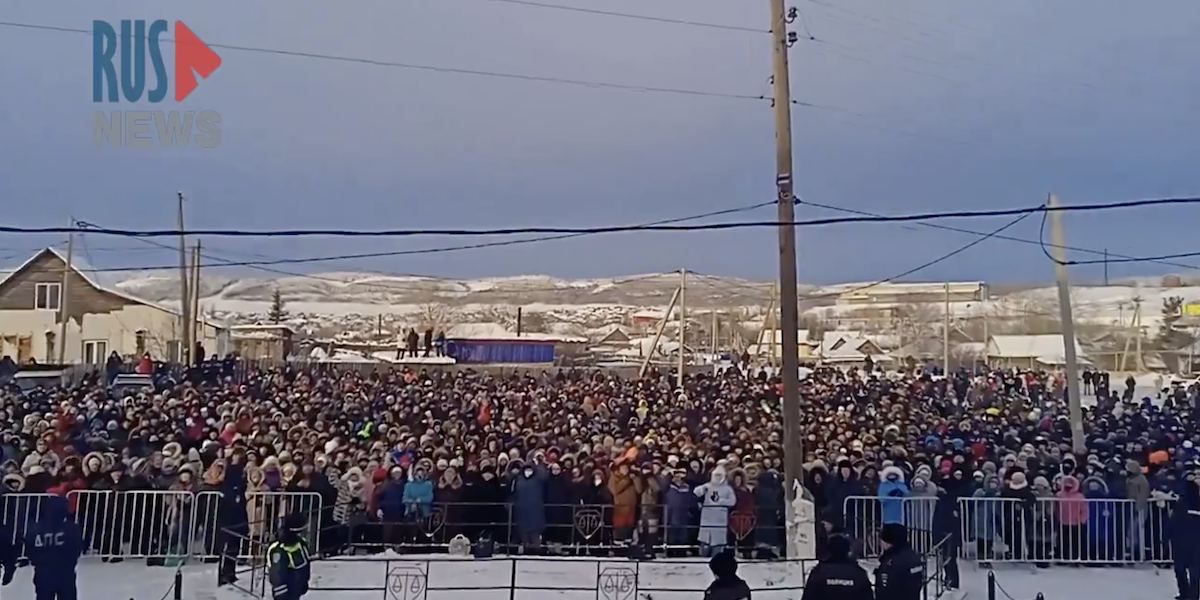In recent days in Baymak, a small city in Russia, more than a thousand kilometers from the capital Moscow, there have been notable protests against the much criticized conviction of a local activist, which the demonstrators consider specious. They were unusually well attended by Russian standards, where the violent repression implemented by the authorities and the threat of arrests have discouraged major protests for years.
It is believed that those in Baymak, a city of 17 thousand inhabitants in the Republic of Bashkiria (a region of central-southern Russia not far from the border with Kazakhstan), are the largest protests since the beginning of the Russian invasion in Ukraine, i.e. since February 2022: despite the risks and temperatures below ten degrees below zero, around three thousand people protested. There were also clashes with the police, who used batons and tear gas to disperse them, and dozens of arrests. Some of those arrested were charged with “mass rioting”, a crime that carries up to 15 years in prison.
In some cases, the demonstrators threw snowballs at the officers in riot gear, other times gloves and hats, or even the truncheons of the policemen themselves who they had managed to grab: the authorities said that some officers were also injured. Internet access has been limited in the region, probably to prevent protesters from organizing.
Despite the efforts of the authorities, there are already about 2 thousand people at the court, reports RusNews pic.twitter.com/fO3pkWfA7E
— Siberia Post (@SibirPost) January 17, 2024
The protests began on Monday, when the sentencing of Fail Alsynov, a local activist, was expected. The protests had led the court to move the date from Monday to Wednesday, but the demonstrations were repeated and were even more attended. Alsynov was sentenced to four years in prison to be served in a penal colony, a particularly harsh Russian detention center where inmates are forced to work for the state.
The activist has denied the charges of incitement to ethnic hatred with which he was convicted, claiming that they were triggered by the incorrect translation into Russian of a phrase he had said in Bashkir, a language spoken by more than a million people in the Russian republic of Bashkiria. In a speech delivered during a protest against gold mine plans in April, Alsynov referred to people from the Caucasus and Central Asia (two regions south of Russia) as “kara halyk.” , which literally means “black people”: Russian authorities considered it derogatory and racist. Some independent Russian newspapers, however, have pointed out that that expression is colloquially used in Bashkir to indicate “common people”, which is what Alsynov also says to maintain his innocence.
In Baymak, #Bashkortostan republic, #Russiathere are escalating scuffles with the police taking place at a #protest rally.
Protesters demand the release of the ethnic Bashkir activist Fail Alsynov who was sentenced to 4 years in prison earlier today:
— Alex Kokcharov (@AlexKokcharov) January 17, 2024
According to the protesters, the accusations are actually a pretext for the governor of Bashkiria, Radiy Khabirov, to eliminate Alsynov. The activist had in fact played a prominent role in previous protests against the attempt to open a mine on a hill considered sacred in Bashkir tradition, and also led a cultural group, called Bashkort, disbanded in 2020 after being declared extremist. Protesters chanted slogans calling for Khabirov’s resignation.
Bashkiria, also called Bashkortostan, is a federal republic, one of the various types of federal subjects that make up the Russian Federation. The Federal Republics enjoy greater autonomy than most other federal subjects, as they are significantly inhabited by an ethnic minority. In this case they are precisely the Bashkirs, a population that speaks a language related to Turkish and other languages of the Central Asian republics, such as Kazakhstan, which is near the southern border of Bashkiria.
